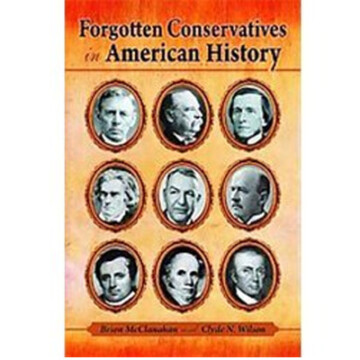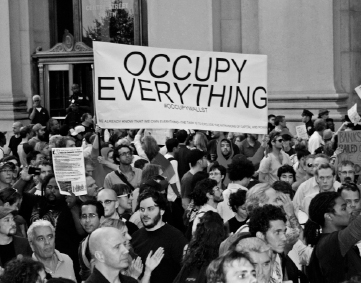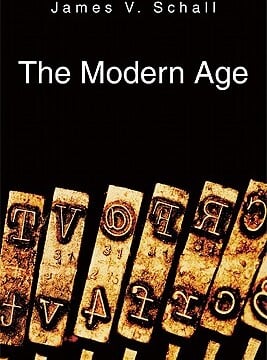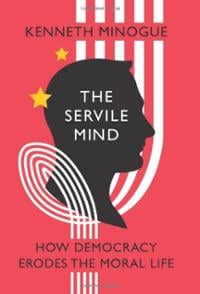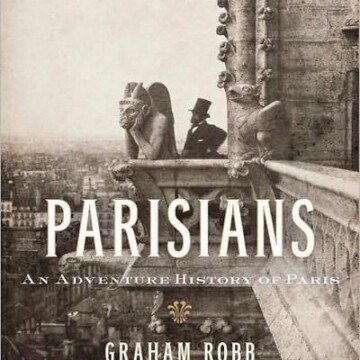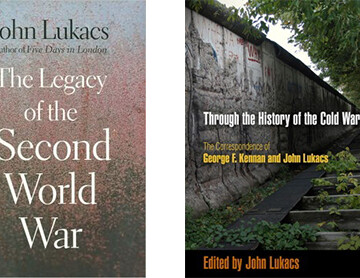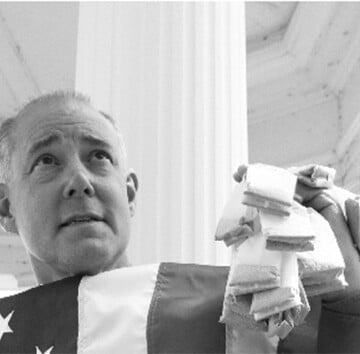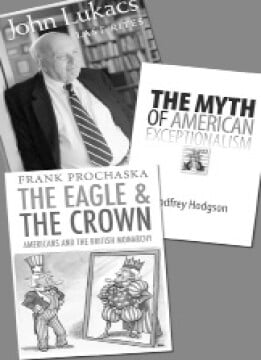This book might have been called “Forgotten Figures in Real American History”—a social and intellectual reality, tradition, and political-economic program whose life ended, effectively, in 1861, though many dedicated public and literary men (including most of the contributors to this journal) have devoted—or rather sacrificed—themselves to resuscitating it, or at least to keeping its memory...
Author: Chilton Williamson (Chilton Williamson)
Free Will in History
Since 1945, democracy’s reputation has climbed so high that, by the beginning of the 21st century, democracy itself had become nothing short of an idol throughout much of the world. This makes it difficult to imagine a time when democracy was widely regarded by political philosophers, writers, and artists not as the best but rather...
The Life You Save Could Be Your Own
The thesis that modern ideologies are a secular replacement for transcendent religions is old hat even to the half-educated in Western society. (The phrase “immanentizing the eschaton” was coined by Eric Voegelin and popularized by William Buckley in the 60’s.) And so a cursory glance at James Schall’s book suggests that the author is simply...
The Obamnesty
Shortly after Barack Obama’s inauguration, rumors began spreading in the immigration-restrictionist movement that the President would attempt to accomplish the “comprehensive immigration reform” that Congress had denied his predecessor by imposing it on the country through executive order. Now he has used his claimed executive powers to announce a partial amnesty for young illegal immigrants...
Civilization and the One Percent
As a confirmed member of the Ninety-Nine Percent, I do not believe that the One Percent has too much money. I think that it does not have money enough. Even President Obama is unclear about his reasons for wanting to raise taxes on the well-to-do (the people with an income of $250,000 he regards as...
Neither “Gay” Nor “Marriage”
Peter Hitchens, writing in The Spectator last March, asked why we should be concerned with stopping several thousand homosexuals from getting married when heterosexual marriage is so threatened by dysfunction and divorce. The social conservatives’ obsession with the subject is, he argued, simply “a stupid distraction from the main war,” like the battle of Stalingrad. ...
“I’m a Republican, But…”
At a recent dinner party, a Republican senator in the Wyoming legislature remarked that the most common personal call she receives from her constituents begins with, “I’m a Republican, but . . . ,” and ends with a request for some or another government benefit or service. Americans are fond of complaining that their political...
Obama and the Bishops
The U.S. Conference of Catholic Bishops has had a rough time of it lately, and I won’t say they don’t deserve it. Barack Obama is their President, after all, when it comes to most political issues; for example, immigration and immigrants’ rights, tax policy, economic inequality, “social justice,” peaceful internationalism, and national healthcare. The exception,...
Democracy and the Internet
At least one historian has noted that democracy is inherently inflationary. The phenomenon of inflation is not restricted to money and finance. Too much of anything reduces the value of that thing, and others with it. Political inflation, or extreme democracy, degrades the political system, as well as the economy it is tempted to inflate...
Head to Head, Together
Apologists for industrialism, as well as its critics, agree that the industrial mode of economic production, and industrial society itself, do not have the choice of arresting their growth at a desired level, or even to slacken momentum. Like the cancer cell, when the system stops growing, it dies. A carcinoma perishes only after it...
A Disillusioned World
Democracy has meant so many things over the past 2,500 years that it is really impossible to make any comprehensive statement about it that applies to all of its usages. The historical record shows that what people called democratic government and democratic society existed for millennia before the birth of the Industrial Revolution in the...
Pragmatic Destruction
Greek writers, and writers coming after them for the next 2,000 years, attributed the short life and violent end of democratic governments to democracy’s infallible tendency toward demagoguery and the dispossession of the wealthy and educated by the poor and ignorant. Tocqueville thought democracy’s fatal weakness to be uniformity of thought and opinion, and the...
The Aphid on the Machine
While the majority of the columns printed on the New York Times’ op-ed page seem intended to energize the reader by alerting him to some impending social, economic, or political evil shortly to be foisted on the country or the world by the Republican Party or some other sinister force on the right, the contemplated...
The Other Leviathan
The world has always been a place of unexamined terms. Probably it has never been so full of them as it is under modern democratic industrial capitalism, which—depending upon the rigor with which one defines the word democratic—is actually a contradiction in terms. Industrialism, which essentially is applied natural and human power on a large...
The Monism of Perfection
I first encountered Kenneth Minogue as a sophomore at Columbia, when his name appeared on a reading list for a course in modern political philosophy. The professor, it goes without saying, was a radical who had his own reasons for disliking liberalism, but I do not recall his criticisms, if any, of Minogue and his...
Contradiction and Collapse
The modern conflation of democracy with the welfare state to the contrary, there is, in fact, a vast, actually unbridgeable, gulf between these two things. Democracy had previously assumed a citizenry independent enough—socially, financially, intellectually, and morally—to be able to form fair, balanced, and informed opinions concerning public matters and issues of state. The welfare...
A Grand Day Out
I became acquainted with Peter Stanlis through my connection with The Rockford Institute, yet he is always associated in my mind with New Mexico, where our late mutual friend Jim Rauen had retired from his construction business in Chicago. Jim and his wife, Ann, were for many years benefactors of TRI. I no longer remember...
The Tyranny of Democratic Politics
In his classic history of the Lombard Communes—the finally doomed medieval republics of Northern Italy—W.F. Butler suggests that the creative and individualistic nature of the Italian people favored a rich cultural life over a stable political one. This could explain why modern Italy, historically a politically dysfunctional country, is nevertheless a civilized and delightful one. ...
Beyond Democracy
Prophets like Aleksandr Solzhenitsyn understood that the 20th century was the substance of which prophecy is made. Its history is a poetic saga, the poetry written in God’s own fierce verse. The first decade of the 21st century was inclined to look back at its immediate centennial predecessor with a degree of self-satisfaction amounting to...
The Problem of Industrialism
Many years ago, on a train trip from New York City to Philadelphia, a friend (a city girl, actually) remarked to me, as we passed through the Jersey industrial swamps, that she would happily cancel the Industrial Revolution, supposing only that modern dental technique could be rescued for the benefit of a restored pastoral society....
Who Cares Who’s Number One?
President Obama, in his State of the Union Address last January, called upon American students, teachers, scientists, and business executives to “out-innovate, out-educate, and out-build the rest of the world.” We are living, the President announced, in a “Sputnik moment.” As polls show the majority of the country considers the United States to be rather...
Soothe the Savage Soul
The Autobiography of Mark Twain, recently released, contains a reminiscence, dictated by the author, of a mass public meeting on the night of January 22, 1906, held as a fundraiser on behalf of Booker T. Washington’s Tuskegee Institute on the occasion of its silver anniversary. According to old Mark’s figures, 3,000 people filled the hall,...
Paris Personified
In an established literary conceit, houses become people, and people become houses: Roderick Usher and the House of Usher, Quasimodo and Notre Dame. Similarly, people become their cities, and cities their people. Parisians is not an “important” book like Graham Robb’s magisterial work of the historians’ art, The Discovery of France. But it is indisputably...
The Women Come and Go. . .
If the media could invent a headline that comprehensively described the definitive news of the world today, it would be something like Experts Confirm Top Rail Is on Bottom. For almost my entire working life I have been hearing how the upper classes are being displaced by the lower ones, the American native-born by immigrants...
Comprehensive Conservatism
One result of the rebalanced political power in Congress and the rise of the Tea Party within the Republican Party is that we are all likely to be spared talk about “compassionate conservatism” for the next couple of years; anyway, until the GOP discovers—as is more than likely to happen in 2012—that conservatism of the...
At Sea Again
A perfect 360-degree horizon, occluded in the nearer distance by cloud shadow and smears and smudges of squall, is something sensed, not seen. All around lies a mottled expanse of turquoise, wine-blue, cobalt, and purple patches streaked with brilliant sunshine alternating with gray shadow and scuffed into variously textured sheets ruffled and smoothed by the...
Joe Sobran as I Knew
I met Joe Sobran in 1973 when I was working as history editor at St. Martin’s Press and had begun writing for National Review. I don’t remember how exactly, but the occasion must have been one of the open-house cocktail parties at the magazine’s offices at 150 East 35th Street, held every other Wednesday evening...
Cold War, Warm Friends
The legacies of every war include controversy regarding its origins, its prosecution, its conclusion, and its material and political results. In the case of World War II, John Lukacs argues that among its major legacies was the Cold War, whose cause was the rigid division of Europe agreed upon by Winston Churchill and Joseph Stalin...
The Easy Persuasion
I have read in the newspapers lately that the scholarly journals have begun to experiment with a new procedural system of editorial acceptance. For generations, article submissions have been made to the editors, who in turn sent the manuscripts out for peer review by specialists in the field. Grants of academic tenure depend heavily on...
Caring in Colorado (and Everywhere)
Not long ago I attended a dinner hosted by a Catholic laymen’s organization in the social hall of a church on Colorado’s Front Range. The meal was followed by after-dinner speeches and concluding remarks by an official representing the organization. “We are caring Catholics of Colorado” were almost the first words out of her mouth. ...
The Happy Few
Stendhal had the delightful habit of ending his books with the closing dedication, in English, “TO THE HAPPY FEW.” The phrase is thought to be a borrowing from Henry V (“We few, we happy few, we band of brothers . . . ”) or perhaps from Goldsmith’s Vicar of Wakefield, where the vicar anticipates his...
The New American Mob
After 16 months, perhaps the best one can say for the Tea Party is that the contempt it originally provoked within the American establishment has turned to consternation. If the Tea Party were composed of real Indians, the elite would be understanding, if not exactly encouraging, and not in the least alarmed or offended. Since,...
Cannibal Statistics
In debate, it is always possible to be right for the wrong reason. For instance, in supporting the proposition that cannibalism is immoral, I might argue that, historically, cannibalism encouraged the killing of human beings who might otherwise have been kidnapped by Arabs or rival African tribesmen and sold ...
Cannibal Statistics
In debate, it is always possible to be right for the wrong reason. For instance, in supporting the proposition that cannibalism is immoral, I might argue that, historically, cannibalism encouraged the killing of human beings who might otherwise have been kidnapped by Arabs or rival African tribesmen and sold into slavery in the southern United...
Earthly Purposes
The New York Times’ obituary for Michael Foot, who led the Labour Party in the general election that brought Margaret Thatcher to power in 1983 and who died in March at the age of 96, quotes the following passage from a campaign speech Mr. Foot delivered that year: We are not here in this world...
Sam Francis’s Mad Tea Party
Reading up for a book on the fate of democracy since Tocqueville published Democracy in America in 1835, I recently came across an excellent study, Aristocratic Liberalism: The Social and Political Thought of Jacob Burckhardt, John Stuart Mill, and Alexis de Tocqueville, by Alan S. Kahan. Professor Kahan includes these men in a group of...
Journalism as Direct Mail
“Politics and abuse have totally corrupted our tastes,” Horace Walpole complained to a correspondent in 1771. “Nobody thinks of writing a line that is to last beyond the next fortnight.” Politics in Great Britain in the late 18th century was as agitated as that of America early in the 21st, although the divisions it reflected...
Three Cities, Three Empires
Stendahl begins his peculiar autobiography, The Life of Henry Brulard, with his alter ego standing at the summit of the Janiculum Hill, surveying the city of Rome, west to east. It is October 16, 1832, and Brulard faces his cinquantaine in three months. Fifty years, he thinks! But Raphael’s Transfiguration ...
The Mental Time Machine
The Metropolitan Opera has a new production of Bizet’s Carmen, which premiered in New York City last New Year’s Eve. I read the review by Anthony Tommasini, the New York Times’ most competent music critic, who understands singing as well as he knows operatic literature. Mr. Tommasini raved over the production, the work of the...
Three Cities, Three Empires
Stendahl begins his peculiar autobiography, The Life of Henry Brulard, with his alter ego standing at the summit of the Janiculum Hill, surveying the city of Rome, west to east. It is October 16, 1832, and Brulard faces his cinquantaine in three months. Fifty years, he thinks! But Raphael’s Transfiguration has been admired for 250...
Courtesy
I have read somewhere that courtesy is the highest form of charity. Whether or not that is true (I like to think it is), courtesy is certainly charity in its least expensive form. Which prompts the question of why, in the age of what an anonymous wit a generation or so ago dubbed conspicuous benevolence,...
Dignity
The phrase human dignity is as ubiquitous today in enlightened global discourse as human rights. Indeed, the two are intimately connected, the first being regarded as a subset of the second, as in, “the right to human dignity.” But dignity in this context is used abstractly and in a universal sense, rather than concretely and...
America: The Movie
Another of those alarming clashes between solid democratic values has arisen, as the Supreme Court has agreed to rehear arguments relating to Citizens United v.Federal Election Committee. In the weeks before the 2008 Democratic primaries, Citizens United, a conservative nonprofit group and creator of an uncomplimentary documentary called Hillary: The Movie, had wished to broadcast...
The Democratic Religion
A half-century ago, a politically ambitious intellectual celebrity named Arthur M. Schlesinger, Jr., defined liberalism’s role as that of offering solutions to problems and solving them. Even in the heyday of the Vital Center, that was far from a complete representation of liberalism’s self-perceived task. Today, when “advanced liberalism” (the phrase is James Kalb’s) is...
The Mystery of Animals
It seems that bipolarity is a significant element of human nature, mental as well as emotional. Human beings tend toward extremes in both thought and feeling, never more than when the subject of either is the animal kingdom with which we share our world. Most of mankind differentiates among animals as ferocious beasts, objects of...
The Trouble With Russia
The Russian government has established a presidential commission charged with countering “attempts to harm Russian interests by falsifying history.” The history it refers to is that of the 20th century, in which domestic and international crimes committed by the former Soviet Union played a salient and notorious role. The Kremlin insists that the sacrifices made...
Of Queens, Democrats, and History
“I am told thee has been dancing with the queen. I do hope, my son, thee will not marry out of meeting.” —American Quaker mother in a letter to her son following the Coronation Ball in 1838 Here are three very excellent books, two on the subject of America, the third substantially so. One of the...
Modern Dress
The proverbial visitor from Mars—or perhaps I should say Neptune, since the only intelligent life known to exist on Mars today is robotic, crawling in and out of craters as it frenziedly snaps digital photographs like an ordinary terrestrial tourist—anyhow, the proverbial visitor from outer space would never guess from visiting Earth’s Western and Westernizing...
The Classless Republic: An Impossible Society
I cannot see the least possibility of recreating either an elite republican class (if, by “elite,” one means an untitled aristocracy) or the American Republic itself. The notion of a republic is a product of classical political thinking, which is now virtually dead in the Western world, and never appeared elsewhere. Not only has the classical...
Return to Rome
Paul Theroux laments that the world is aging badly, that the world he knew as a young man has nearly vanished, that the decline and decay of precious things is everywhere apparent. Theroux should know; he travels more than I do. Also my own ventures at home and abroad depressingly confirm his impressions. Except when...
